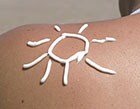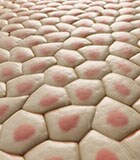 B Vitamins
B Vitamins
The B vitamins are needed for skin metabolism and synthesis. Vitamin B6 and B3 (niacin) are required for the synthesis of collagen, which is the protein that gives skin its strength. Vitamin B5 helps the skin maintain its barrier function. Vitamin B7 (biotin) helps skin enzymes function correctly; biotin deficiency can result in an itchy, scaly skin. In addition, vitamin B9 (folic acid), B2 (riboflavin), B6 and B12 are involved in the synthesis and repair of DNA and proteins in skin cells.
It may be that vitamin B3 (niacin) plays an important role in reducing skin cancer risk. It was found that callus-forming cells are more sensitive to light or radiation damage when they lack niacin. Damage to the genetic material (DNA) can no longer be repaired, which causes more and more cells to die. People with niacin deficiencies are more light-sensitive and could have an increased risk of skin cancer.
A positive influence on the skin, as an important part of the immune system, has also been ascribed to vitamin B3. It is thought that UV radiation can suppress the function of immune defense cells in the skin, as well as in the rest of the body. The niacin compound nicotina-mide seems to be in a position to reduce the immunosuppressive effect of sunlight.
 The damaging effects of solar ultraviolet (UV) radiation on the skin are well recognized: UV-B radiation affects mainly the thin outer layer of the skin (‘epidermis’), and is responsible for sunburn, the most known form of skin damage.
The damaging effects of solar ultraviolet (UV) radiation on the skin are well recognized: UV-B radiation affects mainly the thin outer layer of the skin (‘epidermis’), and is responsible for sunburn, the most known form of skin damage.  Vitamins E and C
Vitamins E and C Carotenoids
Carotenoids B Vitamins
B Vitamins Vitamins A and D
Vitamins A and D Essential fatty acids
Essential fatty acids